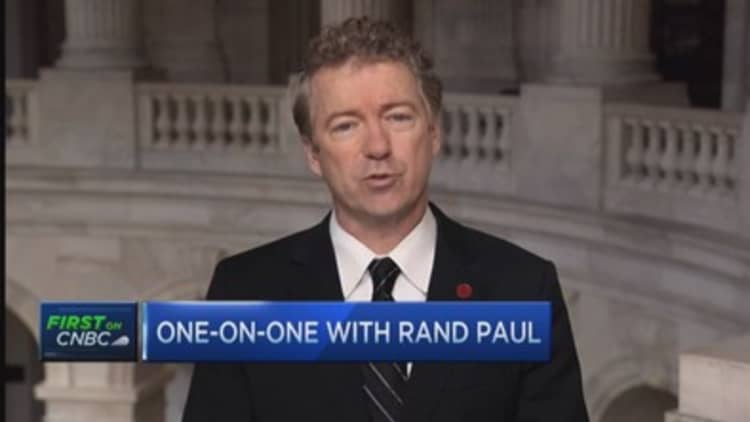
While vaccines have been one of the greatest medical breakthroughs in U.S. history, they should be voluntary, Sen. Rand Paul, R-Ky., told CNBC on Monday.
It's an issue of freedom, he said.
"I'm not arguing vaccines are a bad idea. I think they are a good thing. But I think the parent should have some input. The state doesn't own our children. Parents own the children," Paul said in an interview with "Closing Bell."
Paul was echoing comments he made earlier in the day to conservative radio host Laura Ingraham.
"What happens if you have somebody not wanting to take the smallpox vaccine and it ruins it for everybody else? I think there are times in which there can be some rules, but for the first part it ought to be voluntary," he told Ingraham.
The controversy over vaccinations has picked up steam with the recent outbreak of measles, which originated at Disneyland in California and has since spread over several states.
Read MoreThe US measles threat: Now at 'critical point'
"Public awareness of how good vaccines are for kids and how they are good for public health is a great idea," the senator said. However, "I don't think there is anything extraordinary about resorting to freedom."
Paul specifically took issue with the Hepatitis B vaccine being given to newborns, and the fact that multiple vaccines are given at the same time.
"I've heard of many tragic cases of walking, talking normal children who wound up with profound mental disorders after vaccines," he said.
Corporate tax holiday
Meanwhile, U.S. companies with cash overseas would be able to bring that money back into the country at a 6.5 percent tax rate under a new proposal by Paul and Sen. Barbara Boxer, D-Calif., instead of the current 35 percent rate.
Tax experts have criticized the proposal, saying it would raise federal revenues at first, but would reduce them in the long run and encourage companies to shift more profits abroad and wait for the next tax holiday.
Paul insisted those critics are wrong, citing a study that showed the 2005 tax holiday brought $300 billion of new capital to the U.S. and $30 billion of new tax revenue.
"The whole purpose of doing this is to bring money home," he told CNBC on Monday. "This is to lower [the] tax rate, to bring more money home and to take that new money, some of the tax revenue, and put it into the highway fund. I think this is a win, win, win."
Read MoreObama: 'Critical error' if this doesn't happen
While he'd like to make the rate permanent, or even make it lower, Paul said this was the best chance to get a lower rate signed into law this year.
"This proposal is for five years and the hope is that we will actually see that it is a net positive over five years and that we will renew it and hopefully this is a step towards making it permanent."
White House bid?
Paul also told CNBC he was thinking about a run for the White House in 2016.
"We're looking around the United States and seeing if the message resonates."


